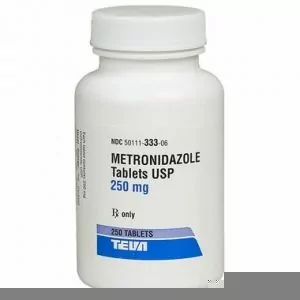What is Metronidazole?
Metronidazole for dogs is a strong antibiotic that is used in human and veterinary medicine. Though metronidazole, or Flagyl, has not yet been approved by the FDA for use in dogs. Metronidazole in dogs is an extremely common treatment for gastrointestinal upset.
If you’ve spent any time working in an animal clinic, you’ve likely worked with metronidazole.
What is Metronidazole Used for in Dogs?
Metronidazole is commonly used in dogs as an anti-diarrheal antibiotic. Metronidazole can also be used to treat inflammation of the large intestine, protozoal infections such as Giardia and Trichomonas, and complications associated with Inflammatory Bowel Disease (IBD).
As metronidazole is becoming a common staple in veterinary clinics, it’s being used to treat other conditions outside of the gastrointestinal region. Metronidazole has been used to treat oral and dental infections, bone infections, and other internal abscesses. Since Metronidazole can cross the blood-brain barrier, it’s also been used to treat infections of the central nervous system as well.

How Does Metronidazole Work?
Metronidazole works by destroying and preventing the creation of DNA in infectious organisms. When tissue becomes damaged from inflammation, infection, or any other cause, there is generally poor oxygen circulation within these tissues. When this happens, only certain bacteria that don’t require oxygen can continue to thrive.
Metronidazole works by inhibiting the DNA production and repair of the anaerobic (no oxygen) cells within the tissues. This results in death to anaerobic cells, without harming the aerobic cells present in healthy tissue.
You can read this article if you want to learn more about Metronidazole in Veterinary Medicine.
How to Give Metronidazole For Dogs
As with all types of antibiotics, they have a tendency to affect the intestinal tract. That isn’t exactly the best thing when given to a dog already suffering from diarrhea or similar issues, but food can curb the effects. Therefore, Metronidazole for dogs should preferably be provided with food.
This is to protect the stomach lining while the drug is being absorbed and hide the pill from our very clever furry friends!
Metronidazole Dosage For Dogs
The recommended dose of Metronidazole in dogs will vary depending on the condition that is being treated. Generally, you can expect a vet to prescribe anywhere from 7-11mg per pound, and up to 22mg per pound for more severe infections.

The Different Forms of Metronidazole?
Metronidazole for dogs comes in a variety of forms and flavors! Naturally, the medication is quite bitter, which will cause most dogs and cats to avoid it like the plague. This is one of the reasons for the different forms Metronidazole for dogs are made in. The most common are:
- Flavourful liquids (always shake well before use).
- Sugarcoated tablets or capsules.
Take care not to crush the tablets or capsules. The sugar is only a coating on the outside, so if the tablets are crushed, the tablet/powder will taste horrible, and you are not likely to get it down your dog’s throat. At least not without a significant struggle, which isn’t fun for anyone.
In some places, Metronidazole is also available in an injectable form. This is, however, only available to be administered by a veterinarian.
Metronidazole for Dogs Side Effects
Metronidazole is considered to be a fairly safe drug, and usually only comes with risk when used in excess or in dogs that suffer from other medical conditions. Though metronidazole is considered safe, it should be avoided if possible in dogs with any of these conditions:
- Kidney disease
- Liver disease
- Pregnancy
- Seizure disorders
- Neutropenia
In the rare case that dogs have reactions to metronidazole, you may see:
- Vomiting
- Drooling
- Anorexia
- Changes in urination
More severe symptoms that are present in metronidazole overdose/toxicity include:
- Seizures
- Twitching
- Ataxia
- Agitation
- Liver damage
If you fear that your dog has consumed a higher dose of metronidazole than recommended, or see any of the symptoms listed above, be sure to contact your vet immediately.
Does Metronidazole Make Dogs Sleepy?
We’ve already talked about the fact that Metronidazole interacts with the DNA in bacteria, but it also has an antiinflammatory action–especially within the gastrointestinal tract. This may be related to suppressing parts of the immune system. That may cause some dogs to become sleepy, just like when we humans take an antihistamine!
As long as it isn’t excessive tiredness or the dog is becoming completely unresponsive, it is not something to worry about and is a pretty natural side effect.
If your dog becomes very tired or has any other long-lasting or extreme side effects, always consult your veterinarian.
Where to Buy Metronidazole For Canines
Metronidazole for dogs is a prescription drug. This means it can only be prescribed by a veterinarian (or human doctor for humans, of course). This also means it can only be sold by and bought at pharmacies. If you ever see Metronidazole for sale elsewhere, do not buy it.
The sale and administration of antibiotics are heavily regulated worldwide, and therefore, owners should never buy them from private salespeople. If purchased privately, the purity, efficacy, and safety of the drug cannot be guaranteed. It could cause issues from the medication not having the desired effect to serious health complications.
Metronidazole Storage Instructions
How you store Metronidazole depends on the form. The oral liquid forms need to be refrigerated and shaken well before being administered to any dog. This is because the liquid the medication has been dissolved in, can in some cases, expire.
If it’s Metronidazole tablets or capsules, they should be kept in a tightly sealed container at room temperature. It is in these cases also essential to protect it from heat. So keep the container away from sunlight for long periods and don’t place it right next to the stove etc.
What Should You Do if You Miss a Dose?
If you are in any way in doubt, always contact your veterinarian. They will be able to guide you in your unique situation.
However, most often, the recommendation will be to give the forgotten dose as soon as possible. But, if it’s almost time for the next dose, skip the missed one. Continue hereafter with the regular schedule. Consult your veterinarian to discuss whether you should extend the course slightly. Don’t ever give your dog a double dosage of Metronidazole.
Drugs That React With Metronidazole When it Comes to Dogs
As with all types of medications, the drug can interact with others. This is why it is important to tell your veterinarian of any other types of medication your dog may be receiving. This includes–and isn’t limited to–vitamins, supplements, and herbs.
Some of the drugs that react with Metronidazole for dogs include:
- Warfarin: Metronidazole can, in combination with warfarin, cause excessive bleeding.
- Phenobarbital and phenytoin: Both drugs can cause increased metabolism of Metronidazole. This means the Metronidazole won’t have the necessary time to function in the body, and its efficacy will fall.
Metronidazole can also cause a decreased metabolism of other drugs, which is why it’s crucial to never administer Metronidazole yourself without guidance from a professional.
Metronidazole and Antibiotic-Resistant Bacteria
Antibiotic resistance is a worldwide issue and occurs when some bacteria become resistant to the effects of antibiotics. Either because the antibiotic can’t enter the bacteria or because the bacteria learn to “fight back.”
Whatever the cause, we all have a role to play in fighting antibiotic resistance, which has been named by the World Health Organisation (WHO) as one of the biggest threats to global health.
As with almost all types of antibiotics, some bacteria can be resistant to Metronidazole. It is vital to first and foremost follow your veterinarian’s recommendations, which can include:
- Complete the course of antibiotics. Even if your dog seems much better after half the period, you should complete it.
- Never accept antibiotics from family, friends, or unauthorized salespeople online or elsewhere.
- Never hand out antibiotics to other people or their pets. Metronidazole administered for one dog’s gastrointestinal disease will not necessarily have the same effect on other dogs’ infected wounds.
It is also important to note that not all dogs may need to receive antibiotics, Metronidazole or others, to treat infections in the gastrointestinal tract or elsewhere. So be open to your veterinarians’ suggestions of alternative treatment options.
Summary
Metronidazole is a wonderful option to help treat diarrhea and other common infections in dogs. Make sure to study up on this medication, as you’re sure to see it often in your veterinary career! Metronidazole for dogs is an excellent drug that helps animals worldwide recover from diseases and infections. It is generally considered a pretty safe drug, with few side effects and interactions. Nonetheless, the administration should always be done by a vet to ensure the health and safety of our furry best friends!
If you enjoyed this article, make sure to take a look at our article on Inflammatory Bowel Disease in Dogs on our blog.
